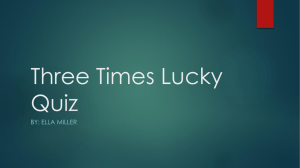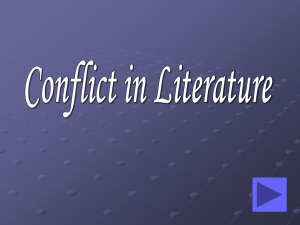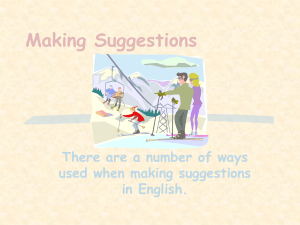Ethical Issues Analysis
advertisement
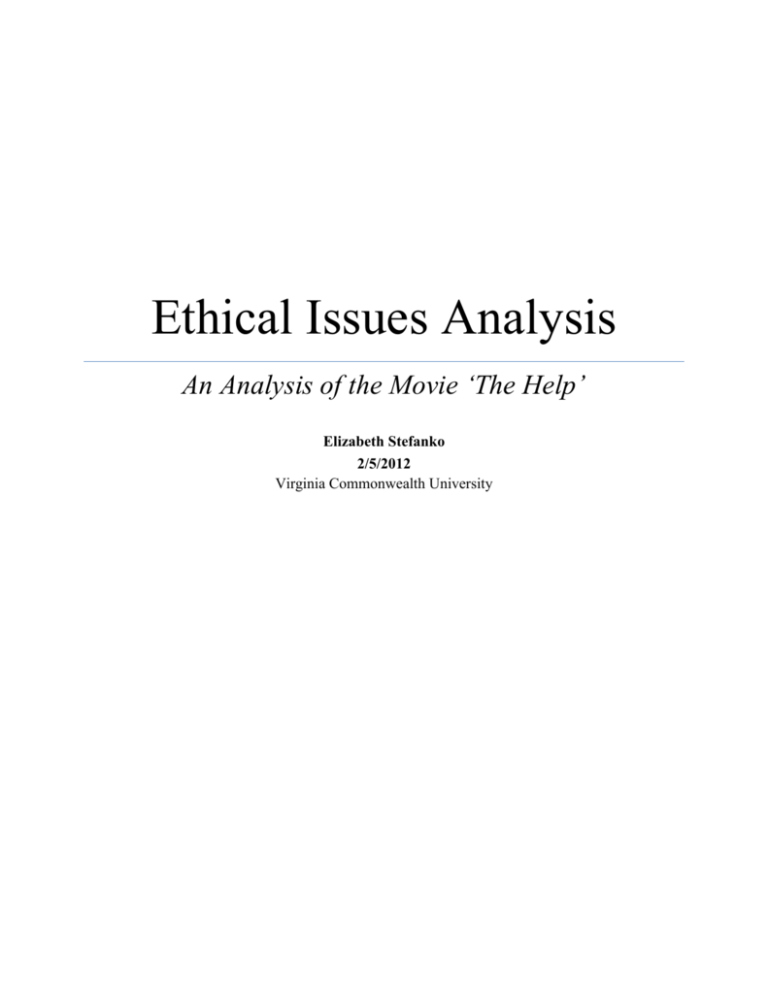
Ethical Issues Analysis An Analysis of the Movie ‘The Help’ Elizabeth Stefanko 2/5/2012 Virginia Commonwealth University 1 Ethical Issues Analysis The movie The Help is set in Mississippi during the Civil Rights era. It is a perfect snapshot of the troubles a small town faces when thrown into a time of change. Skeeter Phelan returns to her hometown after receiving her Journalism degree from Ole Miss. She is a fiery, tenacious character who wants nothing more than to be a writer. Once thrown back into her small town, Skeeter begins to see her world a little differently. She begins her journey at a weekly bridge game with all of her high school friends. Quickly, Skeeter realizes they have nothing in common. She does not approve of the way her friends treat the domestic help, others that are not in their social group, or even each other. The movie traces Skeeter’s personal growth as she sets out to find a focus for her writing career, but more importantly develops a passion for exposing the exploitation of a class and race of people. Important Ethical Principals Portrayed in the Film There were three distinct ethical themes in the movie The Help. Class, race and gender inequalities are explored throughout the movie. Class Skeeter belongs to an elite social group in her town. She is the secretary of the Junior League. All these ladies, except Skeeter, are married housewives that retain domestic help. Their days are spent at luncheons, bridge dates and numerous club events. The domestic help in turn are charged with the raising of their children and all domestic responsibilities of cooking and cleaning. Immediately, there is tension in the group because Skeeter does not fit this mold. While she would like to have a boyfriend, she is not tied to the companionship of men for her identify. This independence is threatening to the President of the Junior League and Skeeter’s best friend, Hilly. Hilly is determined to have Skeeter date a friend of her husband’s and hopefully marry him. However, Hilly’s attentions are not solely on Skeeter. She focuses much 2 Ethical Issues Analysis of her time belittling others to keep her power within the group. Hilly demeans Elizabeth by making her feel inferior. Elizabeth tries to emulate Hilly, but on a limited budget. She can afford domestic help, but the help knows she must help Elizabeth cover up that her belongings are not expensive or perfect compared to Hilly’s. For example, Elizabeth’s dining room table has a large scratch on the surface. Aibileen, her maid must cover the scratch when preparing for bridge and must boost Elizabeth’s confidence when asked about her homemade dresses. Racial The movie is laced with many racial inequalities. Aibileen and Minnie are the main characters from the black, domestic help group. The movie goer gets to see the inequalities through their eyes. The domestics experience daily humiliations. When they ride the bus to and from work they must sit in the back. Once at work, they cook, clean, and take care of the boss’s children. Because of their color, the domestic help have to eat in the kitchen by themselves at lunch using the same plate, utensils and cup every day. This routine is established because the white family will not use the same kitchen ware as a black domestic. The degradation continues under the constant pressure of Hilly. She has developed a bathroom initiative where every white family builds a separate bathroom for their black domestic help. The purpose as claimed by Hilly, is to add value to the home. She goes as far as to say that they are protecting their children with this initiative because black people have different diseases and those diseases can be spread to their white children if the same bathroom was used. The domestic help are powerless. They must endure the insults, the poor working conditions and the inhumane stances of their white bosses. If they do take a stand in any way, the retaliation is either to fire them and spread rumors about the quality of their work or to have them arrested for stealing. This is evident in two separate incidences with Hilly. She 3 Ethical Issues Analysis manipulated Elizabeth into firing Aibileen for stealing even though that was not the case. Elizabeth did not want Aibileen to leave, but she would not stand up to Hilly. Gender Independent, well-educated Skeeter does not fit the mold of a white, southern woman of wealth. The women of her hometown are all housewives who hire domestic help to do their housework. Skeeter wants more. She is driven to be a serious writer. Her passion is her career, not becoming a wife and mother. The black women in this town during this era are domestic help. They have limited education because they have often left school to become maids to help pay the bills for their family. Aibileen and Minnie represent the typical life of a domestic. When Minnie is fired from her job, the viewer hears her beaten by her husband because the loss of job could affect their lives. Her husband receives no repercussions for hurting her. How do the Characters Respond to the Ethical Issues Skeeter Skeeter tackles the unethical treatment of the help by writing a book. Courageous in her efforts to expose the cruel treatment of a particular race and class of people, she understands the dangers that she places herself and the maids in, but sees the value of exposing the problems in this world. The book is the culminating act, however, Skeeter covertly addresses the inequalities throughout the movie. She refuses to publish the Bathroom Initiative, but instead advertises for commodes to be left on the lawn of Hilly’s home. This passive aggressive attitude continues as she probes other women of her race and class to think about how they treat others. She aggressively confronts her own mother about the reasons why their longtime maid and, in her eyes, family member left. It is through this confrontation that her mother gives Skeeter the best 4 Ethical Issues Analysis compliment that she could receive. She tells Skeeter she is her role model. Her mother explains that she should have been bold and not conform to other’s views when she fired her maid. Aibileen and Minnie Aibileen and Minnie address the inequalities of their lives by taking the chance to tell their story. After realizing the book could have the power to change opinions and attitudes, the ladies become driven to get the story right. They risk their jobs and their safety to meet with Skeeter. When the book’s publication is jeopardized because the number of interviewees is limited, Aibileen and Minnie make it their mission to get other maids to join their cause. The retribution that many of the maids feel after the death of Medgar Evans and the imprisonment of a falsely accused maid drives the domestic help to take a risk and join the cause. The domestics can sense that Skeeter is a woman of integrity because she has the trust of Aibileen and Minnie. Hilly There is no change in the character of Hilly. She has all of the power in the Junior League and uses that power to intimidate the others. Hilly confronts Skeeter after the book is released. She realizes that Skeeter is the one person she cannot control. However, Skeeter leaves for her dream job in New York and Hilly is left unchecked in their hometown. The movie ends with Hilly pressuring Elizabeth to fire Aibileen. The reason is based on a lie, but Elizabeth is unwilling to lose her status and connections to power so she caves to Hilly’s desire. Ethical Implications of the Movie The movie The Help depicts a moral crisis (Johnson, p.95). The treatment of domestic help in the south was unethical. The main character, Skeeter, influences two domestics, Aibileen and Minnie to be courageous and help her expose the mistreatment of black domestic help from 5 Ethical Issues Analysis their point of view in a book. In turn, the three ladies become the moral heroes of the story (Johnson, p.95). Through the work they did together, each become stronger in their convictions. Race Because Minnie and Aibileen are willing to risk their safety and occupations, life in this small town is exposed. The town would not change overnight, but the awareness of the unethical treatment of a particular race and class of people is pushed to the front of people’s minds. It allows people to assess their own actions and hopefully begin questioning what is right and wrong. Through this enlightment, an entire race of people is able to live a better life as the years pass. The film records the evolution of changing laws and signals the often painful struggles of the Civil Rights movement. Class and Gender Skeeter defies the stereotype of what a young, white southern woman of money should be. She works diligently to prove herself as a writer while tackling the unethical treatment of the Black race. The change may not have happened right then, but the possibility of a different way of life became apparent. Her ability to work and be successful in her own right, may have inspired others to seek a different path of life besides motherhood. Skeeter’s power was quiet. It was the type of inspiration that takes hold and slowly grows in numbers. The change may not have happened right then, but the possibility of a different way of life became apparent. Conclusion The Help is a powerful movie. The possibilities to discuss class, race and gender inequalities were endless. Each theme can be related to events that are going on now in our world. People of all races, ethnicities and genders are being persecuted. Hopefully, there are people like Skeeter, Aibileen and Minnie who are willing to risk everything in order to inspire 6 Ethical Issues Analysis change. Leaders cannot cause change overnight, but constant exposure to the right thing can cause discussion and action in others. Thus, a movement can be stimulated by one person’s courage to think differently. 7 Ethical Issues Analysis References Johnson, C. (2012). Making ethical challenges of leadership: Casting light or shadow. Los Angeles, CA: SAGE Publications.
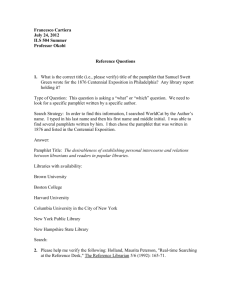
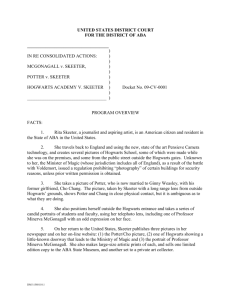
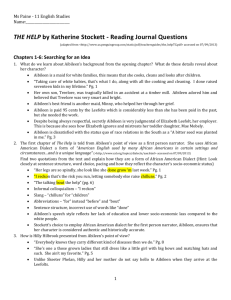
![The Help[1]](http://s3.studylib.net/store/data/006618301_1-d854d00a0c87a5bc0eec6d787932abc9-300x300.png)
